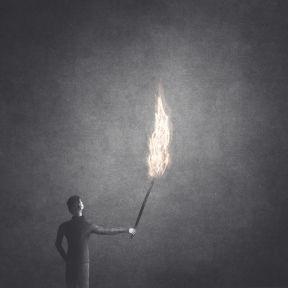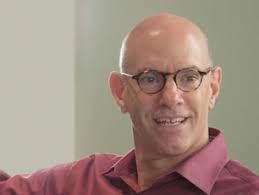RESILIENCE- Broken Hallelujah: How the Heart Can Heal. Poet-philosopher Mark Nepo talks about paradox, courage, resilience, and wonder. Reviewed by Tyler Woods

KEY POINTS-
- We are born a whole, but we need each other to be complete.
- Often, what matters doesn't reach us until the crisis is over.
- Who is the loudest voice in your mind that's not your own?
With over a million copies sold, Mark Nepo has moved and inspired readers and seekers all over the world with his number one New York Times bestseller, The Book of Awakening. Beloved as a poet, teacher, and storyteller, Nepo has published 25 books (in 20 languages), including The Book of Soul, More Together Than Alone, Seven Thousand Ways to Listen, and, most recently, Falling Down and Getting Up. He has appeared on Oprah Winfrey's Super Soul Sunday program and been the recipient of numerous awards and honors. These days, Nepo devotes his writing and teaching to the journey of inner transformation and relationships, and continues to offer readings, lectures, and retreats around the world. He and I caught up recently from his home in Kalamazoo, Michigan, to talk about another recent book of poems, The Half-Life of Angels, and tips he's picked up along the way on his "broken hallelujah" journey of becoming fully human.

Mark Matousek: I was intrigued by this line from The Half-Life of Angels. “Often what matters doesn't reach us until the crisis is over.” What does that mean to you?
Mark Nepo: Expanding and contracting are rhythms of life, both biologically and spiritually. Difficult circumstances can feel contracting, and believing they will be followed by expansion can be challenging. One of the definitions of functional faith is that when life constricts, the vastness hasn't changed. The constriction is real, but we need to hold on and be grateful once it lets go. That is when we can see the lesson or growth that build resilience and confidence.
There's a great metaphor in the Upanishads equating spiritual growth to a caterpillar moving forward. It bunches up, which moves it back, before inching forward. It's the same thing with constriction and expansion.
MM: Functional faith happens at that moment when we can't see the way forward?
MN: Yes. Václav Havel, the first president of the Czech Republic was also a poet and a playwright. He said that hope is not the optimism that things will turn out well, but the belief that things, regardless of how they turn out, will have meaning.
MM: I'd like to ask you about another passage. “We cling to everything; clothes, memories, dreams when only burning them will warm us.” What do you mean?
MN: We cling to things thinking they will protect us, but we also cling to self-identity. There are times when we need to hide who we are for external protection but more often, self-protection comes from being who we are.
MM: You write, “Each time we suffer or love, we are dipped like a ladle into the waters that outlive us.” Which waters are you referring to?
MN: My experience of my father dying opened me to a different notion of resilience that I'm still exploring. By being authentically myself and feeling all that is mine to feel, I was rewarded by touching into the stream of all feeling. The mystery of that common feeling is resilience. It acts like a fish that finds the current of eternity through emotional and spiritual thoroughness.
For me, this act was simply feeding my father apple sauce in the hospital. I didn't want to interrupt his breathing. I didn't want the spoon to hit his teeth. All of life was suddenly in that rhythm and in that amazing moment of holding nothing back but being everyone who ever fed a dying parent. I tripped into complete wonder, dipped the ladle in the water of all feeling and all time.
MM: You compare life to a koan. That implies that you see existence as, first and foremost, mysterious, unsolvable. “Each life is a koan to be lived with,” you write. What do you mean?
MN: Let me quote Martin Buber. “The world is incomprehensible, but it is embraceable.” We are asked to stay in an endless embrace. Everything is a teacher. Everything helps us live into that koan, that riddle, that is our life. This speaks to the Western traditional belief that wisdom is the understanding of truth, while indigenous and Eastern traditions believe that wisdom is the experience of truth. Out of fear, we look for what will confirm what we already know. But education is a cup overflowing, it is not mistaking what is familiar as true.
MM: Nor can we ignore what's unpleasant. You warn against putting on a happy face or coping with adversity by reframing what is difficult. "This is about whether we fight the fall into life or dive,” you write. Why?
MN: One of the offshoots of our modern experiment has been to make a cartoon of the unalienable rights of life, liberty, and the pursuit of happiness. You couple entitlement to a stress-free, challenge-free life with our habitual, conditioned suppression of feeling, and then the only things that are acceptable to the watcher are sanitized feelings.
But we are strong enough and open enough that we don’t have to fear the full spectrum of feelings. They are the teachers that lead us to oneness. We were miseducated to think peace and joy are the still points when trouble stops. Trouble never stops, but when we go into a deeper place of feeling, it takes the edge off the agitation of being in the world.
MM: So you aren't a fan of trigger warnings and politically correct speech censorship?
MN: No, I’m not. Therapists roleplay difficult situations for a reason. We get strength from calling things as they are, not from shielding young people from the beautiful complexities of being human.
Great love and great suffering always break open our bubble. In some ways, while we are suffering in our society, we're not suffering enough. When you fall, I reach for you. If you saw a child sitting on the edge of a well and you thought that child was going to fall, you would drop everything and try to save that child. That kindness has nothing to do with your philosophies or political stance. When we act on that, it breaks what we think are requirements for getting involved or caring for others.
MM: One last question. As a writer and spiritual teacher, you emphasize that it doesn't matter how we "arrive," just that we do. What does arriving mean to you?
MN: Arriving is the place where everything's burned off, where we're in the beauty of the is-ness of being in this amazing life. There are a thousand ways to fall and a thousand ways to get up. It's the witness who reminds us that they all work.
Leonard Cohen's “Hallelujah” is an amazing song that exemplifies this for me. One of the lines is, “It's not someone who's seen the light. It's a cold and broken hallelujah.” The broken hallelujah is the watcher, but the witness says, “Hallelujah.” You'll get there, and that's what matters.
- Questions and Answers
- Opinion
- Motivational and Inspiring Story
- Technology
- Live and Let live
- Focus
- Geopolitics
- Military-Arms/Equipment
- Seguridad
- Economy
- Beasts of Nations
- Machine Tools-The “Mother Industry”
- Art
- Causes
- Crafts
- Dance
- Drinks
- Film/Movie
- Fitness
- Food
- Juegos
- Gardening
- Health
- Home
- Literature
- Music
- Networking
- Other
- Party
- Religion
- Shopping
- Sports
- Theater
- Health and Wellness
- News
- Culture

